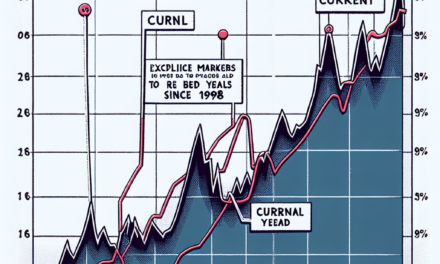“Beyond the Millions: Navigating the Hidden Costs of Wealth.”
Introduction
Many millionaire households, despite their substantial net worth, often experience feelings of financial strain due to a combination of lifestyle inflation, high living costs, and economic pressures. As their income and assets grow, so do their expenses, often leading to a cycle of increased spending on luxury goods, private education, and exclusive services. Additionally, living in affluent areas with high property taxes and cost of living can further exacerbate financial pressures. Economic uncertainties, such as market volatility and inflation, also contribute to a sense of insecurity, prompting even wealthy individuals to feel financially constrained. This paradox highlights the complex relationship between wealth and financial well-being, where having a high net worth does not necessarily equate to financial peace of mind.
Rising Cost Of Living
In recent years, the rising cost of living has become a significant concern for households across various income brackets, including those traditionally considered financially secure. Surprisingly, even millionaire households are not immune to this phenomenon, often feeling financially strapped despite their substantial wealth. This paradox can be attributed to several interrelated factors that have reshaped the economic landscape, affecting the financial well-being of affluent families.
To begin with, the cost of living has been steadily increasing, driven by inflationary pressures that impact everyday expenses. Housing, healthcare, education, and transportation costs have all seen significant hikes, outpacing wage growth and eroding purchasing power. For millionaire households, maintaining a lifestyle that aligns with their social and economic status often involves substantial expenditures in these areas. Consequently, even with a seven-figure net worth, the financial demands of sustaining such a lifestyle can create a sense of financial strain.
Moreover, the expectations and pressures associated with wealth can exacerbate this feeling. Millionaire households frequently face societal pressures to maintain a certain standard of living, which includes residing in affluent neighborhoods, sending children to prestigious schools, and participating in exclusive social circles. These expectations can lead to increased spending on luxury goods and services, further stretching their financial resources. As a result, the gap between income and expenses can narrow, leaving these households feeling financially constrained.
In addition to lifestyle expectations, investment volatility plays a crucial role in the financial perception of millionaire households. Many affluent families rely on investments to grow and preserve their wealth. However, financial markets are inherently unpredictable, and economic downturns or market corrections can significantly impact investment portfolios. During such periods, the value of assets may decline, leading to a reduction in perceived wealth and creating anxiety about future financial security. This uncertainty can contribute to the feeling of being financially strapped, as households may become more cautious with their spending to safeguard their financial future.
Furthermore, the increasing complexity of financial planning and management can add to the sense of financial strain. Millionaire households often have diverse income streams and complex financial portfolios that require careful management. Navigating tax regulations, estate planning, and investment strategies can be daunting, necessitating the assistance of financial advisors and legal experts. The costs associated with these services, coupled with the time and effort required to manage financial affairs, can contribute to the perception of financial pressure.
Additionally, the desire to leave a legacy for future generations can influence the financial decisions of millionaire households. Many affluent families prioritize wealth preservation and transfer, which may involve setting aside significant resources for heirs or philanthropic endeavors. This long-term financial planning can limit the funds available for current consumption, further contributing to the feeling of being financially strapped.
In conclusion, the rising cost of living, coupled with societal expectations, investment volatility, complex financial management, and legacy planning, creates a multifaceted challenge for millionaire households. Despite their substantial wealth, these factors can lead to a perception of financial strain, highlighting the intricate relationship between income, expenses, and financial security. As the economic landscape continues to evolve, understanding these dynamics is crucial for addressing the financial concerns of affluent families and ensuring their long-term well-being.
Lifestyle Inflation
In recent years, the phenomenon of millionaire households feeling financially strapped has become increasingly prevalent, raising questions about the underlying causes of this paradox. At the heart of this issue lies the concept of lifestyle inflation, a subtle yet powerful force that can erode financial security even among the wealthiest individuals. Lifestyle inflation, also known as lifestyle creep, occurs when an individual’s or household’s spending increases in tandem with their income. As people earn more, they often upgrade their lifestyle, acquiring more expensive tastes and habits that can quickly consume their newfound wealth. This tendency is not limited to any particular income bracket; however, it becomes particularly pronounced among millionaire households, where the stakes are higher and the consequences more significant.
One of the primary drivers of lifestyle inflation is the desire to maintain or enhance social status. As individuals accumulate wealth, they may feel compelled to project an image of success, often through the acquisition of luxury goods, high-end real estate, and exclusive experiences. This pursuit of status can lead to a cycle of ever-increasing expenses, as each new level of affluence brings with it a corresponding set of expectations and pressures. Consequently, even those with substantial financial resources may find themselves living paycheck to paycheck, as their income is continually outpaced by their spending.
Moreover, the influence of social comparison cannot be underestimated. In an age where social media platforms provide a constant stream of curated glimpses into the lives of others, the pressure to keep up with peers can be overwhelming. This phenomenon, often referred to as “keeping up with the Joneses,” can drive individuals to make financial decisions that prioritize appearances over long-term stability. For millionaire households, this can manifest in the form of extravagant vacations, luxury vehicles, and other high-cost items that, while impressive, do little to enhance financial security.
Additionally, the complexity of managing substantial wealth can contribute to feelings of financial strain. As assets grow, so too do the responsibilities associated with managing them. Millionaire households often face a myriad of financial decisions, from investment strategies to tax planning, each with its own set of risks and uncertainties. The pressure to make the right choices can be daunting, leading to stress and anxiety about maintaining and growing wealth. Furthermore, the costs associated with professional financial management, legal advice, and other services can add up quickly, further straining resources.
Another factor contributing to the sense of financial strain among millionaire households is the rising cost of living in affluent areas. Many wealthy individuals choose to reside in cities or neighborhoods with high property values, excellent schools, and abundant amenities. While these locations offer numerous benefits, they also come with a hefty price tag. Property taxes, private school tuition, and other expenses can quickly add up, leaving even the wealthiest feeling financially stretched.
In conclusion, the feeling of being financially strapped among millionaire households is a multifaceted issue rooted in lifestyle inflation. The desire to maintain social status, the influence of social comparison, the complexities of wealth management, and the high cost of living in affluent areas all contribute to this paradox. By understanding these factors, individuals can take steps to mitigate the effects of lifestyle inflation, ensuring that their financial resources are used wisely and sustainably. Ultimately, achieving true financial security requires a careful balance between enjoying the fruits of one’s labor and safeguarding against the pitfalls of excessive spending.
High Tax Obligations
In recent years, an intriguing paradox has emerged: despite possessing significant wealth, many millionaire households report feeling financially constrained. This phenomenon can be attributed to several factors, with high tax obligations playing a pivotal role. Understanding the impact of taxes on these affluent households requires a closer examination of the tax structures and financial responsibilities that contribute to their perceived financial strain.
To begin with, millionaire households often face progressive tax systems that impose higher tax rates on higher income brackets. This means that as their income increases, so does their tax liability. While this system is designed to ensure that wealthier individuals contribute a fair share to public finances, it can also lead to substantial tax bills that significantly reduce disposable income. Consequently, even households with substantial earnings may find themselves allocating a large portion of their income to taxes, leaving less available for savings, investments, or discretionary spending.
Moreover, millionaire households frequently encounter additional tax obligations beyond income taxes. Capital gains taxes, for instance, apply to profits from the sale of assets such as stocks, bonds, or real estate. Given that many wealthy individuals derive a significant portion of their income from investments, these taxes can further erode their financial resources. Additionally, estate taxes, which are levied on the transfer of wealth upon death, can impose a considerable burden on families seeking to preserve their wealth for future generations. These cumulative tax responsibilities can create a sense of financial pressure, even among those with substantial assets.
Furthermore, the complexity of tax regulations often necessitates the engagement of financial advisors and tax professionals to navigate the intricate landscape of tax planning and compliance. While these services are essential for optimizing tax strategies and ensuring adherence to legal requirements, they also represent an additional financial outlay. The costs associated with professional advice can add up, further contributing to the perception of financial strain among millionaire households.
In addition to tax obligations, lifestyle expectations and social pressures can exacerbate the feeling of being financially strapped. Wealthy individuals often reside in affluent neighborhoods, send their children to prestigious schools, and maintain a certain standard of living that aligns with their social status. These lifestyle choices, while seemingly attainable given their income levels, can lead to substantial expenses that compound the financial pressures imposed by taxes. As a result, maintaining such a lifestyle can leave millionaire households with limited financial flexibility, reinforcing the perception of financial constraint.
Moreover, the volatility of financial markets can also play a role in this phenomenon. Many millionaire households have significant investments in stocks, real estate, or other assets that are subject to market fluctuations. Economic downturns or unexpected market shifts can lead to substantial losses, impacting their overall financial stability. In such scenarios, the combination of high tax obligations and market volatility can create a precarious financial situation, further contributing to the feeling of being financially strapped.
In conclusion, while millionaire households possess considerable wealth, high tax obligations, coupled with lifestyle expectations and market volatility, can create a sense of financial strain. The progressive nature of tax systems, additional tax responsibilities, and the costs associated with professional financial advice all contribute to this perception. Understanding these dynamics is crucial for comprehending why even affluent individuals may feel financially constrained, despite their substantial resources.
Investment Volatility

In recent years, the phenomenon of millionaire households feeling financially strapped has become increasingly prevalent, raising questions about the underlying causes of this paradox. One significant factor contributing to this sentiment is investment volatility, which has a profound impact on the financial stability and perceived wealth of these households. As markets fluctuate, the value of investments can experience dramatic shifts, leading to a sense of insecurity even among those with substantial assets.
Investment volatility is an inherent characteristic of financial markets, driven by a myriad of factors including economic indicators, geopolitical events, and changes in market sentiment. For millionaire households, whose wealth is often tied to investments in stocks, bonds, real estate, and other financial instruments, these fluctuations can result in significant changes in net worth. When markets are bullish, the value of their portfolios may soar, creating a sense of abundance. However, during periods of market downturns, the same portfolios can lose substantial value, leading to feelings of financial constraint.
Moreover, the psychological impact of investment volatility cannot be underestimated. The fear of losing wealth can be as powerful as the desire to accumulate it. This fear is exacerbated by the fact that many millionaire households have experienced previous economic downturns, such as the 2008 financial crisis, which left lasting scars on their financial psyche. Consequently, even temporary market declines can trigger anxiety and a perception of financial vulnerability, prompting these households to adopt a more conservative approach to spending and investment.
In addition to the psychological effects, investment volatility also influences financial planning and decision-making. Millionaire households often rely on their investments to fund their lifestyles, including expenses such as education, healthcare, and retirement. When the value of their investments is uncertain, it complicates long-term financial planning. This uncertainty can lead to a more cautious approach, with households opting to hold larger cash reserves or invest in less volatile assets, which may offer lower returns but provide a sense of security.
Furthermore, the increasing complexity of financial markets adds another layer of challenge for millionaire households. With the proliferation of new investment products and strategies, navigating the financial landscape requires a higher level of expertise and understanding. This complexity can lead to decision fatigue and a reliance on financial advisors, whose fees can further strain household budgets. Additionally, the pressure to keep up with market trends and make informed investment choices can be overwhelming, contributing to the feeling of being financially strapped despite having substantial assets.
It is also important to consider the broader economic environment in which these households operate. Rising costs of living, particularly in urban areas where many millionaire households reside, can erode purchasing power and contribute to the perception of financial strain. Moreover, tax policies and regulatory changes can impact investment returns and disposable income, further influencing the financial outlook of these households.
In conclusion, while millionaire households possess significant wealth, investment volatility plays a crucial role in shaping their financial experiences and perceptions. The fluctuations in market value, coupled with psychological and planning challenges, create a complex financial landscape that can lead to feelings of being financially strapped. Understanding these dynamics is essential for addressing the concerns of millionaire households and helping them navigate the uncertainties of the financial world.
Educational Expenses
In recent years, the phenomenon of millionaire households feeling financially strapped has become increasingly prevalent, and one of the primary contributors to this paradox is the escalating cost of educational expenses. Despite possessing significant wealth, many affluent families find themselves grappling with the financial demands associated with providing their children with a high-quality education. This situation is exacerbated by the societal pressure to secure the best possible educational opportunities, which often come with a hefty price tag.
To begin with, private school tuition fees have been rising steadily, often outpacing inflation. For families aiming to enroll their children in prestigious institutions, the financial commitment can be substantial. These schools, known for their rigorous academic programs and extensive extracurricular offerings, charge tuition fees that can rival those of some universities. Consequently, even households with considerable financial resources may find themselves allocating a significant portion of their income to cover these costs. Moreover, the desire to provide children with a competitive edge in an increasingly globalized world further fuels the demand for such elite educational experiences.
In addition to private school tuition, the costs associated with higher education have also surged dramatically. College tuition fees, particularly at renowned universities, have reached unprecedented levels. For millionaire households, the expectation to send their children to top-tier institutions is often accompanied by the willingness to pay exorbitant fees. However, this financial burden is not limited to tuition alone. Ancillary expenses, such as room and board, textbooks, and other educational materials, further compound the financial strain. As a result, even families with substantial wealth may find themselves feeling financially constrained as they strive to meet these educational expenses.
Furthermore, the pursuit of educational excellence often extends beyond traditional schooling. Many affluent families invest in supplementary educational services, such as private tutoring, test preparation courses, and enrichment programs. These additional expenses, while intended to enhance a child’s academic performance and future prospects, can quickly accumulate. The cumulative effect of these costs can lead to a sense of financial pressure, even among those who are ostensibly well-off.
Another factor contributing to the financial strain experienced by millionaire households is the competitive nature of college admissions. The desire to secure a spot at a prestigious university often drives families to invest heavily in extracurricular activities, leadership programs, and other resume-building endeavors. These pursuits, while valuable in their own right, can be costly and add to the overall financial burden. Consequently, families may feel compelled to allocate significant resources to ensure their children stand out in the competitive admissions landscape.
Moreover, the societal expectation for affluent families to provide their children with the best possible education can create additional pressure. The fear of not doing enough to secure their children’s future success can lead to a willingness to spend beyond what might be considered reasonable. This mindset, coupled with the rising costs of education, can result in a sense of financial strain, even for those with substantial wealth.
In conclusion, the feeling of being financially strapped among millionaire households can be largely attributed to the escalating costs of educational expenses. The combination of rising tuition fees, supplementary educational services, and the competitive nature of college admissions creates a financial burden that even affluent families find challenging to manage. As these costs continue to rise, it is likely that the sense of financial pressure will persist, prompting a reevaluation of how educational investments are prioritized and managed.
Healthcare Costs
In recent years, a perplexing phenomenon has emerged: millionaire households, despite their substantial wealth, often report feeling financially strapped. One of the primary factors contributing to this paradox is the escalating cost of healthcare. As healthcare expenses continue to rise, even affluent families find themselves grappling with financial pressures that were once unimaginable. To understand this issue, it is essential to examine the multifaceted nature of healthcare costs and their impact on household finances.
Firstly, it is important to recognize that healthcare costs have been increasing at a rate that outpaces inflation. This trend is not limited to the United States but is observed globally, affecting households across various economic strata. For millionaire households, the expectation might be that their wealth insulates them from such financial burdens. However, the reality is that healthcare expenses can quickly accumulate, especially when considering the costs of long-term care, specialized treatments, and advanced medical technologies. These expenses can be particularly burdensome for families with chronic health conditions or those requiring ongoing medical attention.
Moreover, the complexity of healthcare systems often leads to unexpected costs. Even with comprehensive insurance coverage, out-of-pocket expenses such as deductibles, co-pays, and non-covered services can add up significantly. For wealthy families, who may opt for premium insurance plans or seek care from top-tier medical facilities, these costs can be even higher. Additionally, the pursuit of the best possible care often involves travel to specialized centers or consultations with renowned experts, further inflating the overall expenditure.
Another contributing factor is the demographic shift towards an aging population. As individuals live longer, the demand for healthcare services increases, particularly for age-related conditions. Millionaire households, like any other, are not immune to the financial implications of aging. The need for long-term care, whether in the form of assisted living facilities or in-home care, presents a substantial financial challenge. These services are notoriously expensive, and the costs can deplete even substantial savings over time.
Furthermore, the psychological aspect of financial security plays a role in how millionaire households perceive their financial situation. The fear of future medical expenses, coupled with the desire to maintain a certain standard of living, can lead to a sense of financial vulnerability. This is exacerbated by the uncertainty surrounding healthcare policies and potential changes in insurance coverage, which can create anxiety about future costs.
In addition to direct healthcare expenses, there are indirect costs to consider. For instance, the time and resources spent managing healthcare needs can detract from other financial opportunities. This includes the potential loss of income if a family member must reduce work hours or retire early to care for a loved one. Such scenarios can strain even the most robust financial plans, leading to a feeling of being financially strapped despite having significant assets.
In conclusion, while it may seem counterintuitive for millionaire households to feel financially constrained, the rising cost of healthcare is a significant factor contributing to this sentiment. The combination of escalating expenses, demographic shifts, and psychological factors creates a complex financial landscape that challenges even the wealthiest families. As healthcare costs continue to rise, it is crucial for all households, regardless of their wealth, to plan strategically and consider the long-term implications of their healthcare needs.
Supporting Extended Family
In recent years, an intriguing paradox has emerged: despite possessing significant wealth, many millionaire households report feeling financially constrained. This phenomenon can be attributed to a variety of factors, one of the most significant being the financial support extended to family members. As the cost of living continues to rise and economic uncertainties persist, affluent families often find themselves in the position of providing financial assistance to relatives, which can strain even substantial resources.
To begin with, the concept of family support is deeply ingrained in many cultures, where it is considered a moral obligation to assist relatives in need. This sense of duty often extends beyond immediate family members to include extended family, such as siblings, nieces, nephews, and even cousins. For millionaire households, the expectation to provide financial aid can be particularly pronounced, as their wealth is perceived as a safety net for the entire family. Consequently, these households may allocate a significant portion of their resources to support relatives, which can lead to a feeling of financial pressure despite their overall wealth.
Moreover, the types of support provided can vary widely, ranging from covering educational expenses to assisting with medical bills or even providing a down payment for a home. Each of these commitments can represent a substantial financial outlay, especially when multiplied across several family members. For instance, funding a relative’s college education or helping with healthcare costs can quickly add up to tens or even hundreds of thousands of dollars. When such expenses are recurrent or involve multiple family members, they can significantly impact a household’s financial stability.
In addition to direct financial support, millionaire households may also feel compelled to maintain a certain lifestyle to meet familial expectations. This can include hosting family gatherings, funding vacations, or contributing to family events, all of which can be costly. The pressure to uphold a particular standard of living can further exacerbate the feeling of being financially strapped, as these households strive to balance their own financial goals with the expectations of their extended family.
Furthermore, the economic landscape has evolved in ways that can amplify these pressures. The rising cost of living, coupled with economic volatility, means that even wealthy families must be more vigilant about their financial planning. Inflation, fluctuating markets, and unexpected expenses can all contribute to a sense of financial insecurity, prompting millionaire households to be more cautious with their spending. In this context, the additional burden of supporting extended family can feel particularly onerous.
It is also worth noting that the emotional aspect of family support cannot be overlooked. The desire to help loved ones is often accompanied by a sense of responsibility and, at times, guilt. This emotional component can lead to decisions that prioritize family needs over personal financial security, further contributing to the feeling of being financially stretched.
In conclusion, while millionaire households possess considerable financial resources, the obligation to support extended family can create a sense of financial strain. This is compounded by cultural expectations, the rising cost of living, and the emotional dynamics of family relationships. As a result, these households may find themselves navigating a complex financial landscape, where the balance between wealth and familial responsibility is continually tested.
Q&A
1. **Lifestyle Inflation**: As income increases, so do expenses. Millionaire households often upgrade their lifestyle, leading to higher costs that can make them feel financially strapped despite their wealth.
2. **High Fixed Costs**: Many millionaires have significant fixed costs, such as mortgages on expensive homes, private school tuition, and luxury car payments, which can strain their finances.
3. **Investment Volatility**: A large portion of a millionaire’s wealth is often tied up in investments, which can be volatile. Market downturns can significantly impact their perceived financial security.
4. **Social Pressure**: Millionaires may feel the need to maintain a certain social status, leading to spending on luxury goods, memberships, and events, which can deplete their resources.
5. **Future Financial Obligations**: Concerns about future expenses, such as college tuition for children or healthcare costs, can make millionaires feel financially insecure.
6. **Tax Burden**: High-income individuals often face substantial tax liabilities, which can reduce their disposable income and contribute to a feeling of being financially strapped.
7. **Lack of Financial Planning**: Without proper financial planning and budgeting, even wealthy individuals can mismanage their resources, leading to financial stress.
Conclusion
Millionaire households may still feel financially strapped due to several factors, including high living costs, lifestyle inflation, and the pressure to maintain a certain social status. As income increases, so do expenses, often leading to a cycle where increased earnings are matched by increased spending. Additionally, economic uncertainties, such as market volatility and inflation, can create anxiety about maintaining wealth. The desire to secure financial futures for their families, coupled with the fear of losing their status, can also contribute to this feeling. Ultimately, despite having substantial assets, the perception of financial security is influenced by personal expectations, societal pressures, and economic conditions, leading some millionaire households to feel financially constrained.





